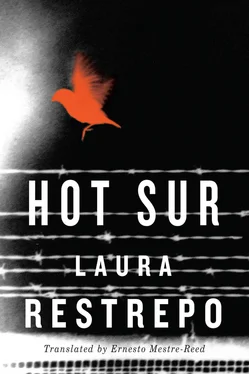Do you know what a coscoja is? Don’t worry, I didn’t either, and when I found out, I didn’t like it at all. I immediately dipped the pendant in rubbing alcohol and left it there all week, me, who, before knowing what it was, put it in my mouth all the time, disgusting. Only my mother, with the coscoja; you always had to be careful with my mother. But be patient. Little by little, I’ll explain everything.
In any case, the day she was leaving, Bolivia dressed in jeans, plain shoes with laces, and a plaid shirt, as if she were going on an excursion to the countryside. I saw her put makeup on her eyes, which were coffee-colored like mine, with long lashes. Many years later, I’d glance on her in a similar manner on the day of her death, with her head on the satin pillow in her coffin of dark wood. She had been made beautiful again, seemed rejuvenated, because near the end fatigue and worry had beaten her; yet on that day she seemed peaceful again, as if the Heno de Pravia had once again restored the resplendence of her skin. I remember watching the shadows of her eyelashes caused by the flames from the altar candles dance softly on her cheeks, creating the sensation that death was treating her lovingly. I’d seen other corpses, and although they did not let me attend the funeral of my husband, I had been to others, and I had never seen a dead person as beautiful as her. Señora Socorro and the other friends roasted a turkey and prepared a Russian salad for the mourners, and we all ate. All of us except Bolivia, she who had always made sure that we never lacked turkey during the winters in America. A few days before Thanksgiving and Christmas, we always went to the parish where they gave out free turkeys so that everyone would have a good meal during those days. So we lined up and got our turkey, and the following day we did it again, and the day after, morning and afternoon, claiming our turkey as if they had not already given us one, and another turkey, and one more, and the best we made out with this scheme is when we got six turkeys one Christmas.
The day she left for America, I looked at Bolivia and thought, I’m so lucky to have such a pretty mother, and at the same time, I grew disheartened because that marvelous radiance who was my mother was going to be so far away from me. Afterward, we bathed the baby Violeta, who had inherited a fair complexion and had the greenest eyes anyone had seen in our neighborhood, where such things were not common, so that strangers stopped us on the street to admire them. Mami, where did Violeta get those huge green eyes? Did her father have green eyes? Bolivia did not respond. She went silent when I asked her about her men. The day she left, we dried Violeta with a towel our mother had put over the heater to warm up; we put Johnson’s powder on her, a diaper, and a onesie made of baby alpaca wool. The whole time, Violeta never cried, she lived as if lost in a dream. I wondered if everything she saw would be green with those eyes of hers. I tried to play with her by shaking a rattle of plastic keys in front of her, but she didn’t notice it.
“Mami,” I told Bolivia, “what good are those eyes on Violeta if she can’t see?”
“She can see. The doctor assured me there’s nothing wrong with her eyes. The thing is that they’re too green,” she responded, and was satisfied with the explanation.
Bolivia’s bags were ready and so were the cardboard boxes with our clothes, but before going out she announced, “Now we’re going to have a little good-bye, soon-to-be-reunited ceremony.”
I, who did not know what a ceremony was, was surprised and delighted when she opened three little blue-velvet boxes and pulled out three metal pendants on gold chains.
“What are they?” I murmured, knowing that we were doing something solemn, that the moment would not be repeated, and that those pendants, whatever they were, represented something. I didn’t really like the dark metal pendants all that much; what was truly beautiful was the gold chain, but regardless, I knew the pendants were important.
“They’re three pieces of the same coin,” she replied, and showed me how they made a whole. On one side of the coin there wasn’t anything, just scratches on the worn metal. On the other side, there was an eight-point cross with the word “lazareto” written in the middle. Around and above the cross, it read “two and a half cents,” and below, “Colombia, 1928.” Bolivia put one of the necklaces on me, lifting my hair to fasten the chain behind. She put the second pendant on the baby Violeta and kept the third for herself. Of course, I didn’t know what a lazareto was, and I didn’t even think to ask; I must have thought of it as something magical that made the pendant a protective amulet. Years later, in America, Bolivia would tell me that such coins had been minted in the first decades of the twentieth century for restricted circulation in leper colonies, to avoid contagion in the rest of the country. They were called coscojas, and the engraved octagonal figure was the cross of the Order of St. Lazarus of Jerusalem, also known as the Templar cross or the cross of the eight beatitudes. That’s when I came to know the horror of leprosy and learned of the great family secret. I found out that my grandmother Africa María had spent her last days being eaten away by the illness in isolation at the leper colony Agua de Dios. Her husband and children never saw her during the nine years she spent there, until they heard about her death and then went looking for her, but only to be there for her burial. Apparently, the husband, my grandfather, had been sending her personal necessities all along — although he never went to visit her, each month he’d send her a suitcase full of food and other goods, with a note that the suitcase wasn’t to be returned. According to what Bolivia told me later, my grandfather preferred to buy a new suitcase every month and deal with the loss rather than get back such a thing impregnated with miasmic airs. Among the contents of the suitcase, there once was an electric iron, which apparently my leprous grandmother never used because she preferred one of those old-fashioned heavy iron ones, one of those you fill with hot coals. That’s what Grannie Africa ironed with, there in her colony for the sick; her flesh may have been falling off in pieces, but she painstakingly cared for her clothes.
My mother was a teenager when her mother died, and she told me that they arrived at Agua de Dios for the burial exhausted after two days of travel, dazed by the heat and the buzzing of insects because the place was in the middle of a swamp. They were not allowed near the lepers who attended the burial but stayed on the other side of the fence. My mother remembered she could see them in the distance, but not their faces, which were covered with rags, and that she had been shaken by the thought that these creatures were the only company her mother had had for such a long time.
The authorities had made the members of the family cover their mouths and noses with handkerchiefs that had been soaked in alcohol. My grandmother’s body was incinerated along with her mattress and other belongings. Bolivia stood there, scratching the swollen mosquito bites on her legs and watching the flames consume someone who was supposedly her mother, but who had been buried alive for so long that she had been almost erased from her children’s memory.
“How can I explain it?” Bolivia told me. “For us, her children, she had always been present, but not as a person, as fear, a shadow.”
When the flames had died out and the embers extinguished, Bolivia saw a metallic glitter in the ashes. She shook herself loose from her father, ran to the place where the pyre had burned, and in spite of the screams of warning, picked up a dried branch and scraped out that little gleaming thing that had caught her attention. It was the coscoja, probably from one of the pockets of my grandmother’s incinerated clothes.
Читать дальше












